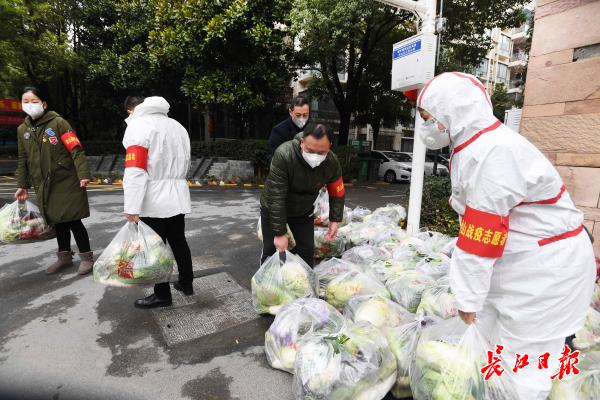

Amid China’s efforts to combat against COVID-19, Chinese communities have played a leading role in ensuring the well being of all people and community workers have been working on the frontline of war against the spread of the virus.

Community workers send vegetables to senior citizens’ homes in Wuhan. (Photo/Changjiang Daily)
According to the latest statistics from the Ministry of Civil Affairs, since the outbreak of the epidemic, nearly 4 million urban and rural community workers have been working on the frontline of prevention and control in China's 650,000 urban and rural communities.
On average, six community workers are servicing a community area, and each community worker serves 350 people with heavy tasks and hard work. The epidemic has tested the modernization of China's social governance capacity and system.
"Dear residents, please cooperate with the work of the community during the epidemic. If the community staff makes a phone call to you, please cooperate with us and inform us of the number of members in your family and their current physical condition. If you have a fever patient at home, please report to the community as soon as possible. "
These days, Liu Yunfei, a member of the Party work committee of Caidian Street, Caidian District of Wuhan in central China’s Hubei province, carries out epidemic prevention publicity in the community area with a loudspeaker every day and makes key remarks to some residents.
The screening of such "four categories" as diagnosed COVID-19 patients, suspected cases, feverish residents, and close contacts is an important task for Liu Yunfei and his colleagues in the community.
In Wuhan, the epicenter for the outbreak of the epidemic, the screening of these "four categories" of people in grassroots communities is an important part of the hierarchical protection system. For the "four categories" of people identified, Wuhan has taken centralized treatment and isolation measures. The new effort to combat the epidemic has been described by many experts and patients as a "substantial step".
In other parts of China, grassroots community forces are also being mobilized.
"Xiao Lei, Xiao Hu, congratulations on your being lifted out of the quarantine today. Tell me what you need at home." Early in the morning on Feb. 9, Miao Lili, Secretary of the Party Committee of Weijia Community, Dongcheng District, Beijing, came to the home of Xiao Lei and Xiao Hu, merchants in the community vegetable market, together with the health care doctor.
The couple has been quarantined at home for 14 days after returning to Beijing from their home town in Hubei province. After the doctor's examination, the couple's physical indicators appear normal and therefore, can be graduated out of medical observation.
During the quarantine period of Xiao Lei and Xiao Hu, community workers monitored their temperature three times a day and brought some vegetables and fruits every two or three days. "We visit them regularly to chat and do some psychological counseling," "Miao Lili said.
In order to contain the spread of the epidemic, some areas have implemented closed management in urban areas and closed management in rural areas. In each community there are active party members, community workers, property security and volunteers working hard for the residents.
"Residents have gradually realized that communities are the communities of common destiny," said Lu Yilong, a professor at the school of society and population at Renmin University of China, adding that as Chinese society matures, the quality of urban and rural community residents is improving, especially in times of crisis.
 Fire brigade in Shanghai holds group wedding
Fire brigade in Shanghai holds group wedding Tourists enjoy ice sculptures in Datan Town, north China
Tourists enjoy ice sculptures in Datan Town, north China Sunset scenery of Dayan Pagoda in Xi'an
Sunset scenery of Dayan Pagoda in Xi'an Tourists have fun at scenic spot in Nanlong Town, NW China
Tourists have fun at scenic spot in Nanlong Town, NW China Harbin attracts tourists by making best use of ice in winter
Harbin attracts tourists by making best use of ice in winter In pics: FIS Alpine Ski Women's World Cup Slalom
In pics: FIS Alpine Ski Women's World Cup Slalom Black-necked cranes rest at reservoir in Lhunzhub County, Lhasa
Black-necked cranes rest at reservoir in Lhunzhub County, Lhasa China's FAST telescope will be available to foreign scientists in April
China's FAST telescope will be available to foreign scientists in April "She power" plays indispensable role in poverty alleviation
"She power" plays indispensable role in poverty alleviation Top 10 world news events of People's Daily in 2020
Top 10 world news events of People's Daily in 2020 Top 10 China news events of People's Daily in 2020
Top 10 China news events of People's Daily in 2020 Top 10 media buzzwords of 2020
Top 10 media buzzwords of 2020 Year-ender:10 major tourism stories of 2020
Year-ender:10 major tourism stories of 2020 No interference in Venezuelan issues
No interference in Venezuelan issues
 Biz prepares for trade spat
Biz prepares for trade spat
 Broadcasting Continent
Broadcasting Continent Australia wins Chinese CEOs as US loses
Australia wins Chinese CEOs as US loses